Summary on The Network State
Introduction
In the past two months I have been reading the book The Network State. It is a thought-provoking book. It first gives an detail explanation of what's going on in the past, and what's up to the current times (and it is not pretty), and giving a few predictions on how will these trajectories goes. At the end, he is proposing an alternative explanation of building a new type of society, which could eventually lead to being a state, and how to do that.
Context
First and foremost, Balaji, the author, said that history is important. Because that's how humans learn and relate it to their existing knowledge inside the brain. Usually when people have a certain proposition, not only will we look at what is proposed, but also why it is proposed. We want to look at the context, and that is history. For example, why did Karl Marx come up with Communism? In what context does he come up with that idea? What is Marx background that make him said history materialism? When it comes to the context of one thing, we are talking about its history.
Those who shapes the history shapes the present, and those who shapes the present likely could shapes the future. So reviewing the world history in a broad way, the book author mentioned that people used to revolve around three powers, also known as the Laviathan: God, State, and now the Network.
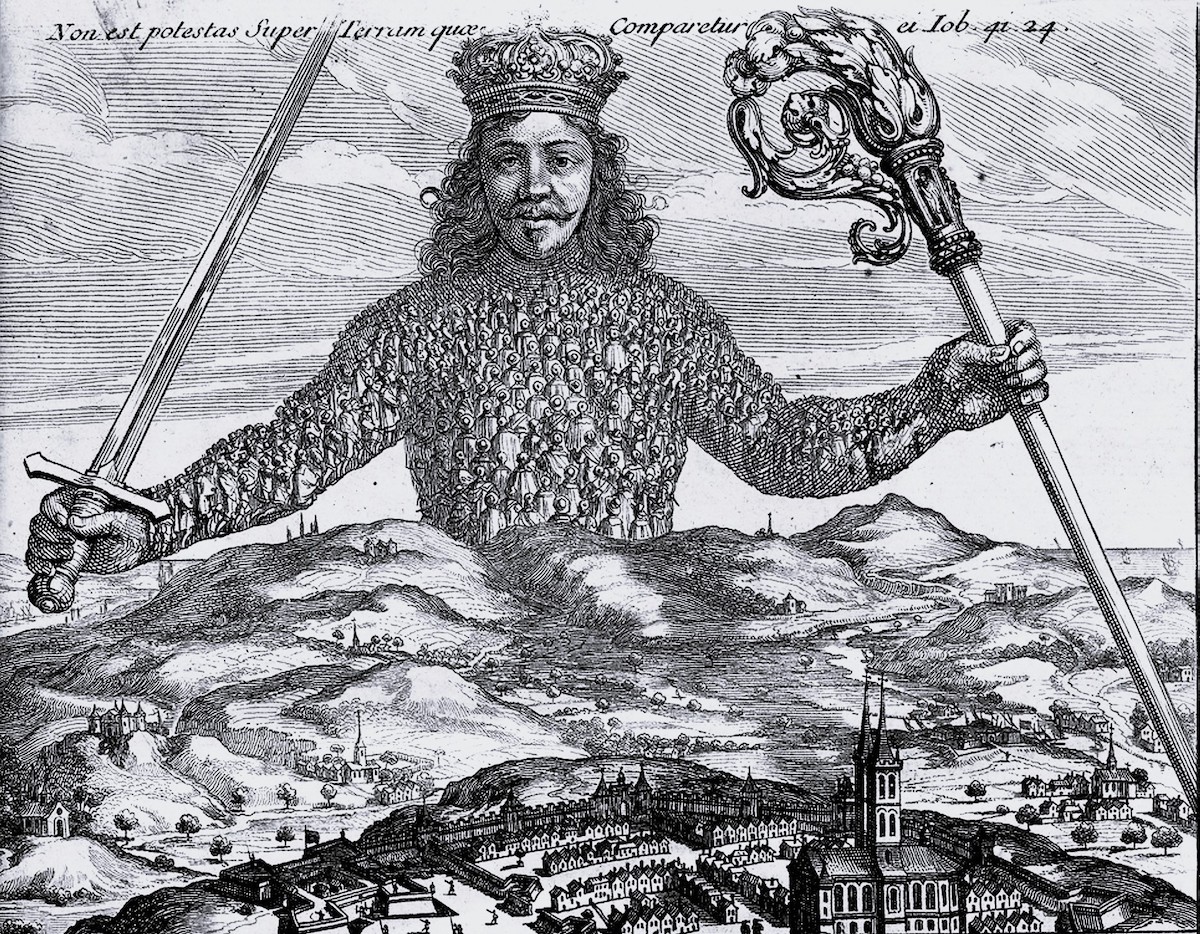
In the Medieval period, people has resolve to use God as the ultimate power. That's why church, which people would equate as God, has a lot of power, including putting people to death. The church also had its own military and territory. That was the times of 16th and 17th centuries. Then there is a power conflict between multiple Lords, the emperor of Holy Roman Empire, and church on who has the ultimate says on what people should do, and that caused a Thirty Years' War within Europe. Peace of Westphalia came out of the war at the end, and establish the foundation of Sovereign States. Countries will honor the sovereignty of other countries and would not interfere with their governance within their territories. From this point, the State / the government of a country gained more and more power on the life of people. That occurs up until the 1980s.
With the development of computing technology and the Internet, "the Network" becomes more and more powerful. Nowaday Facebook, Twitter, and different communication / instant-messaging apps has became the main way of our communication. News and informations is no longer passed using the traditional media, but with these social network tools. They become like the neural network of our body. The companies that initially built these network do not foresee they are building such a platform that hold so much public power. With filtering what information could flow on these platforms, classifying information is misinformation, or which user accounts to ban, the owning companies of these platforms hold a power that even a modern day government would admire. Because they have control the channels of how information flow for the mass.
Current States
Repeating on Ray Dalio's theme in The Changing World Order, the author saw how empires have risen and fallen in the past. From Dutch Empire, British Empire, and now at the point of a declining "US empire" and a rising "China empire". It will soon reach an intersection point when China will out-compete US.
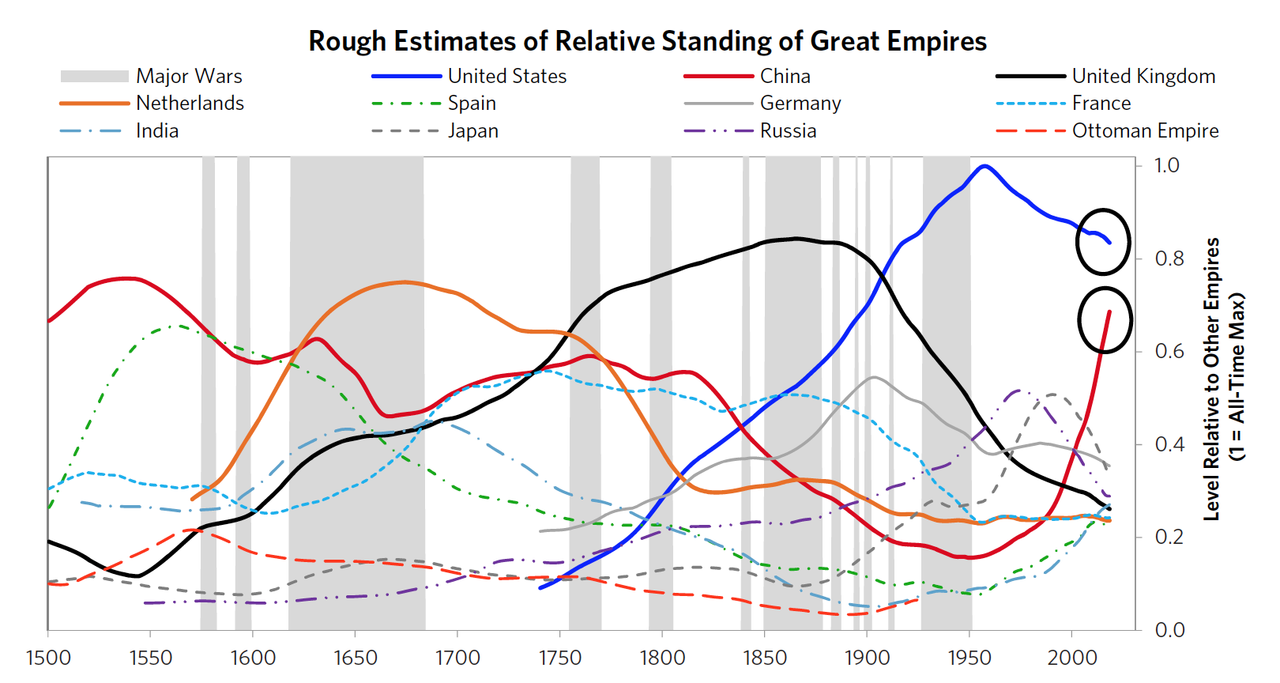
The collapse of an empire is usually triggered by one or more of the following three incidents:
- A severe conflict within the country, that could be a civil war, or a highly splitted groups within the country between, say for example the rich and the poor, or struggle between two classes.
- Invasion from a foreign power that the empire couldn't withhold against.
- A failure of its financial/economic policy that cause the lives of people inside the empire becoming very difficult.
The current states of the global affair can largely be represented with the Triangle of BTC, NYT, and CCP.
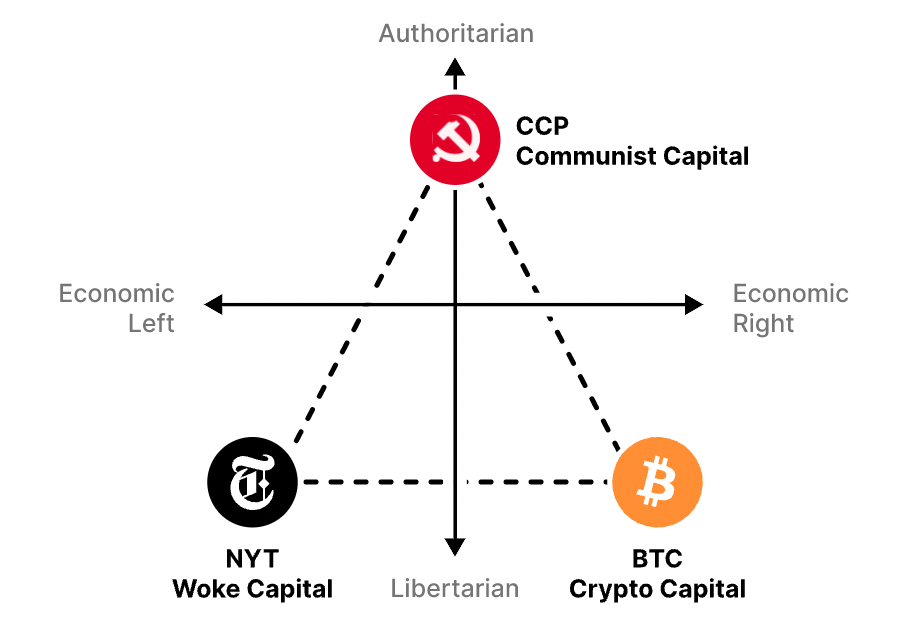
These three type of forces have their corresponding patterns, way of governance, and capital structure, as shown below:
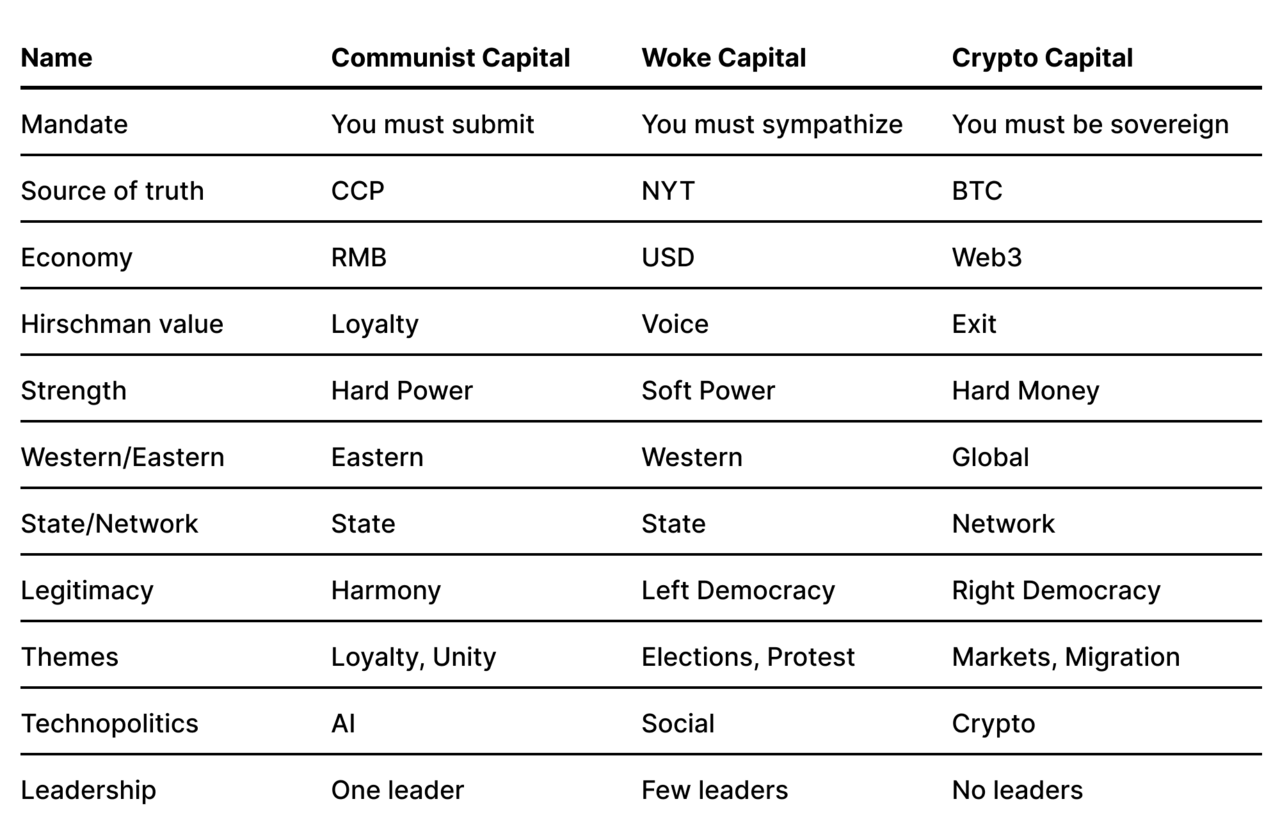
The author expresses how the current political landscape has resolved to - having the progressive left, represented by NYT, that has provoked the US into Great Awokening age. There is also the right conservatives who uphold US nationalism. Then there is a rising China totalitarianism (CCP), and the technocrats that build blockchains and crypto-currencies (the BTC).
NYT (stands for New York Times), represents the Progressive Left in the US politics spectrum. The media is famous for using many "x-ism" words, racism, sexism, etc to provoke the emotion (hatred) of mass. It also spearheaded the Great Awokening that is happening in US. This movement has made US population splitted more than ever since its founding and a lot of societal progress has been hindered due to this split.
On the other side, it is the rise of China. As believed by Ray Dalio and many others, China will soon challenge the number one position of US in its global economics prosperity and military strength. But China is a totalitrian country and when they export their idealogy and "means" of governance, it is not going to be a pretty picture.
So finally the author is raising an alternative viewpoint on the development of blockchains and cryptocurrencies, epitomized by Bitcoins. It has its own sovereignty and no government can really seize the fund (or have any control, for that matter). Blockchain also served as a place where the truth is hold. Once on-chain, records of event will be kept forever. There are always a trace on-chain if anyone try to alter it. It becomes the third kind of power that it keeps the truth without trusting on a government or a centralized corporation.
The Network State
Eventually if we develop the third kind of force, it can eventually become a Network State, something as follows:
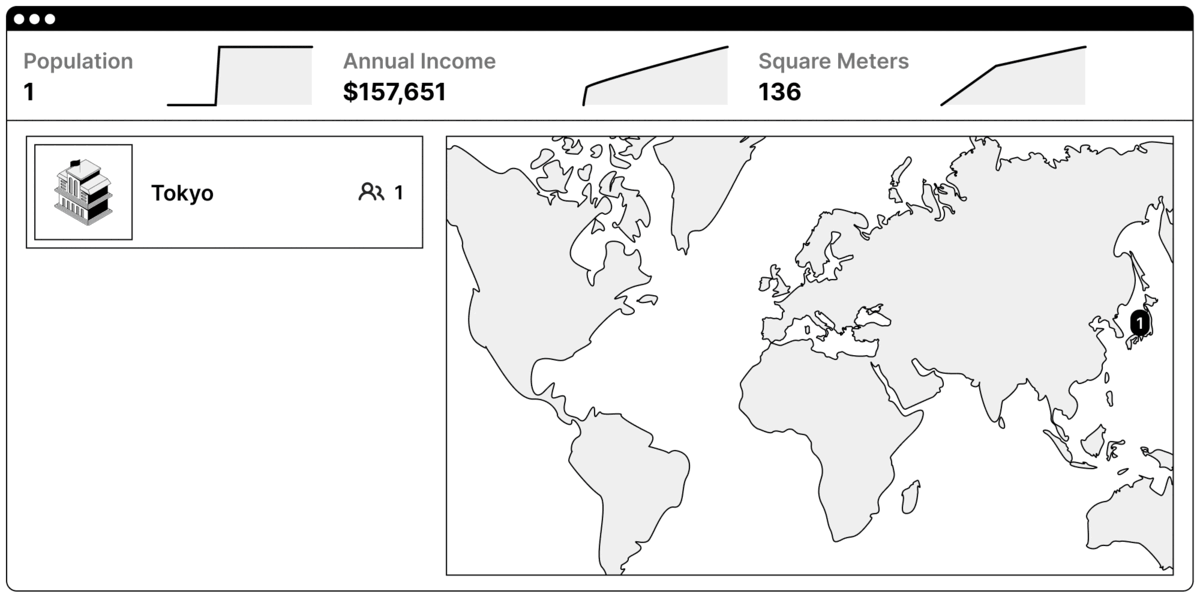
To quote:
A network state is a social network with a moral innovation, a sense of national consciousness, a recognized founder, a capacity for collective action, an in-person level of civility, an integrated cryptocurrency, a consensual government limited by a social smart contract, an archipelago of crowdfunded physical territories, a virtual capital, and an on-chain census that proves a large enough population, income, and real-estate footprint to attain a measure of diplomatic recognition.
There is an elaboration for each of the elements mentioned.
-
a social network - it has to connect its members online, because these people are likely physically splitted in multiple geographic locations.
-
a moral innovation - people joining the network state should have a moral objective to pursue. It maybe no smoking, or practicing meditation, whatever the group decides to advocate. This group must not be formed mere from financial objective and need a higher purpose. This is also what will keep this group going when the time is tough.
-
a sense of national consciousness - they have to have a sense of being the club members and fullfill their membership duty. It could mean paying the "due" or membership fee, or vote on important matters. Otherwise the club cannot be kept as one piece.
-
a recognized founder - need a clear leader so when there is a close call, a leader will come out to lead. Time is going to be tough at every startup phase. It will need excellent execution capability to keep the community going and growing. People also need someone to look up to at the beginning. This is where a recognized founder comes in.
-
a capacity for collective action - members need to align on certain set of principles and able to collectively execute to accomplish their objectives.
-
an in-person of civility - we want to build a high-trust society. In such society we need a basic civility among people during communication and cannot be constantly yelling at each others.
-
an integrated cryptocurrency - we need both the higher purpose (covered in the moral innovation) and a correct economics for the society. Members / citizens will be rewarded and profited for acts they do for the club / state. We also need a currency that is sovereign and people could believe in. Cryptocurrency fits the bill here.
-
a consensual government limited by a social smart contract - the government rules by consent when people sign a particular smart contract with their private keys. They opt-in to be governed by the government, fullfilling its responsibility as the citizen and in turn enjoy the fruits of joining this community. But they are also free to withdraw the citizenship based on the contractual relationship as well.
-
an archipelago of crowdfunded physical territories - the network state starts from a digital community, but it doesn't stop there. Eventually when there are enough members contributing to the club finances, the society can use the proceeds to purchase physical territories so the society has physical footprints and its members have actual venues to perform their activities.
-
an on-chain census that proves a large enough population, income, and real-estate footprint - population, income, and real-estate are some of the important KPIs that a state keeps track of. Traditional nation states perform census every 5 or 10 years, with the network state keeping this data digitally and on-chain. It can even be known in real-time. A society can be proved to be gaining traction when it reach a milestone of, says 10k population, $1B annual income, and 10M meter square real-estate footprint.
-
attaining deplomatic recognition - The network state eventually should be recognized by other nation states and network states. Why is this important? It is because only then other states can offer assistance and regard the society as a sovereign state. People will know that it is not someone daydreaming, but an entity that is actually recognized by others.
The founder will start from a mere startup society (a group of people who uphold certain principles), to a network union (group of people with collective execution capability), then a network archipelago (the membership society with physical territories footprint), and finally a network state (that other nation-states and network-states diplomatically recognized).
Other points worthy to note of
-
that is to say, absolutely, take care of number one, that's important because if you don't do that, you can't help others win. But do that as well.
A good philosophy to practice in life.
-
The term "nation-state", is formed with the word "nation" and "state". Nation is a group of people with common ancestry, sharing the same culture and/or speak the same language. State is talking about the government governing a group of people over a bounded set of territory. Within the territory, the government has a monopoly use of forces, write laws, collect taxes, and protect its territories from foreign invasions. So "nation" is talking about the mass, while "state" is focusing on the government, the elite level, the ruling class.
